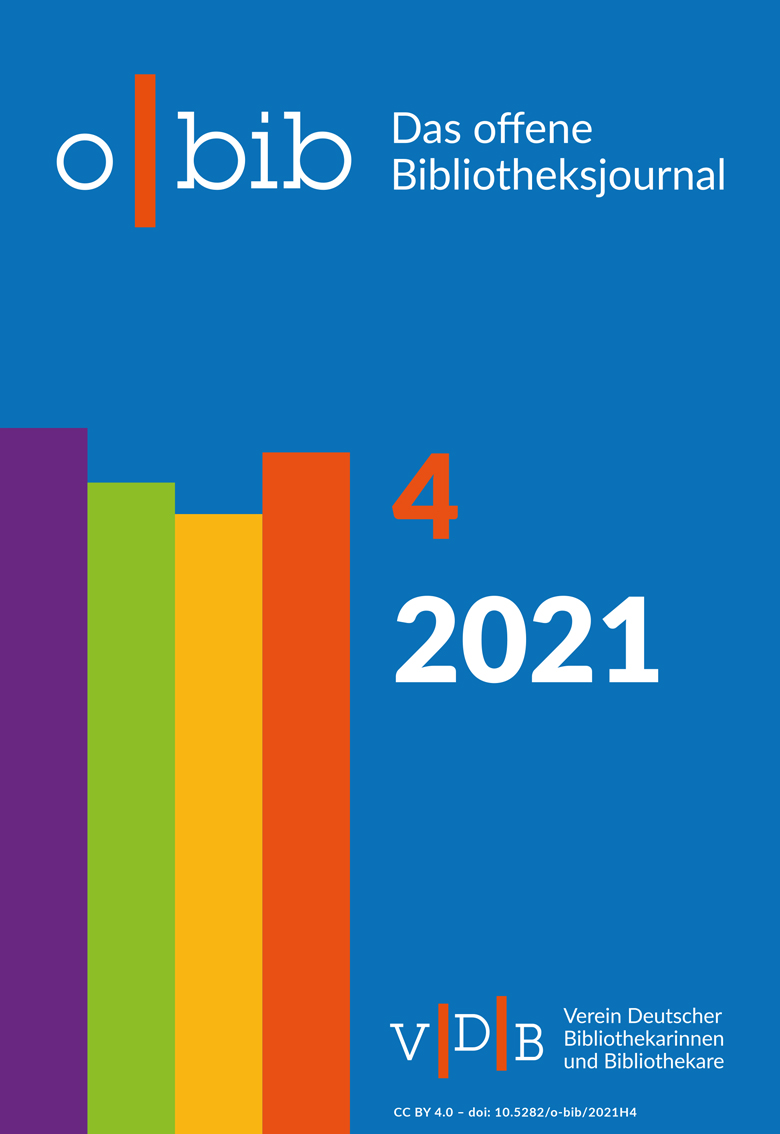Dezentrale Identifikatoren (DIDs)
Die nächste PID-Evolution: selbstsouverän, datenschutzfreundlich, dezentral
DOI:
https://doi.org/10.5282/o-bib/5755Keywords:
Persistent Identifier, Dezentralisierung, Datenschutz, Manipulationssicherheit, Forschungsdatenmanagement, Self-Sovereign IdentityAbstract
This paper discusses the latest W3C standard for decentralized identifiers (DIDs) with respect to research data management. It is shown that due to their centralization, persistent identifier systems (PIDs) currently used in scientific publishing, such as Handle, DOI, ORCID, and ROR, involve fundamental problems with regard to data security, data privacy and data integrity. This is contrasted with DIDs as a possible solution, a new form of globally unique identifiers that can be generated by any individual or organization and operated on any platform deemed trustworthy. Blockchains or other distributed ledger technologies can act as verifiable data registries, but direct peer-to-peer connections, methods built on existing Internet protocols, or static DIDs are also possible. In addition to the scheme, the technical specification in terms of the data model and the usage of DIDs are explained. The differences in comparison to centralized PID systems are outlined as well. Finally, the connection to the underlying new paradigm of a decentralized identity, called Self-Sovereign Identity, is shown. SSI represents an entire ecosystem in which entities form a cryptographically secured trust network based on DIDs and digital proofs of identity to exchange identity-related data in a decentralized, tamper-proof, and privacy-preserving manner. The author concludes by presenting five requirements derived from the discussion related to a state-of-the-art approach to the implementation of persistent identifiers.
References
Berners-Lee, T.; Fielding, R.; Masinter, L.: Uniform Resource Identifier (URI): Generic Syntax, Request for Comments: 3986, Internet Society, 2005. Online: https://www.rfc-editor.org/rfc/rfc3986.txt, Stand: 15.07.2021.
Bundesamt für Sicherheit in der Informationstechnik: Die Lage der IT-Sicherheit in Deutschland 2020, Bonn 2020. Online: https://www.bsi.bund.de/SharedDocs/Downloads/DE/BSI/Publikationen/Lageberichte/Lagebericht2020.pdf?__blob=publicationFile&v=1, Stand: 15.07.2021.
Corporation for National Research Initiatives: Projects, CNRI System & Technology Demonstration Projects, 2020, http://www.cnri.reston.va.us/projects.html, Stand: 15.07.2021.
Corporation for National Research Initiatives: Prefix Registration, handle.net, 2018, https://www.handle.net/prefix.html, Stand: 15.07.2021.
Corporation for National Research Initiatives: Privacy Policy, handle.net, 2015, https://handle.net/privacy_policy_hnet.html, Stand: 15.07.2021.
Daigle, L.; Gulik, D.W. van; Iannella, R. u. a.: Uniform Resource Names (URN) Namespace Definition Mechanisms, Request for Comments: 3406, Internet Society, 2002. Online: https://www.rfc-editor.org/rfc/rfc3406.txt, Stand: 15.07.2021.
DataCite: How do I get DOIs?, DataCite Support, 2020, https://support.datacite.org/docs/how-do-i-get-dois, Stand: 15.07.2021.
DataCite Metadata Working Group: DataCite Metadata Schema Documentation for the Publication and Citation of Research Data and Other Research Outputs: Version 4.4, 2021. Online: https://doi.org/10.14454/3w3z-sa82.
Deutsche Nationalbibliothek: URN-Service, dnb.de, 2021, https://www.dnb.de/DE/Professionell/Services/URN-Service/urn-service_node.html, Stand: 15.07.2021.
Deutsche Nationalbibliothek: Normdaten in der Wissenschaft – Vernetzung von GND und ORCID, dnb.de, 2020, https://www.dnb.de/DE/Professionell/ProjekteKooperationen/projekteKoop_node.html#sprg446188, Stand: 15.07.2021.
Dierkes, Jens: Planung, Beschreibung und Dokumentation von Forschungsdaten, in: Putnings, Markus; Neuroth, Heike; Neumann, Janna (Hg.): Praxishandbuch Forschungsdatenmanagement, Berlin/Boston 2021, S. 303–325. Online: https://doi.org/10.1515/9783110657807-018.
Digital Science: GRID - Global Research Identifier Database, grid.ac, 2021, https://grid.ac, Stand: 15.07.2021.
DomainTools: Whois Record for ror.org, Whois Lookup, o. D., https://whois.domaintools.com/ror.org, Stand: 15.07.2021.
DONA Foundation: About DONA, dona.net, 2020, https://www.dona.net/aboutus, Stand: 15.07.2021.
Ehrlich, Tobias; Richter, Daniel; Meisel, Michael u. a.: Self-Sovereign Identity als Grundlage für universell einsetzbare digitale Identitäten, in: HMD Praxis der Wirtschaftsinformatik 58 (2), 2021, S. 247–270. Online: https://doi.org/10.1365/s40702-021-00711-5.
FORCE11: The FAIR Data Principles, force11.org, 2016, https://www.force11.org/group/fairgroup/fairprinciples, Stand: 15.07.2021.
International DOI Foundation: 7 International DOI Foundation, DOI Handbook, 2018, https://www.doi.org/doi_handbook/7_IDF.html, Stand: 15.07.2021.
International DOI Foundation: 1 Introduction, DOI Handbook, 2015, https://www.doi.org/doi_handbook/1_Introduction.html, Stand: 15.07.2021.
International DOI Foundation: Privacy Policy, DOI.ORG, 2012, https://www.doi.org/w3c/privacy.html, Stand: 15.07.2021.
Moats, R.: URN Syntax, Request for Comments: 2141, Internet Society, 1997. Online: https://www.rfc-editor.org/rfc/rfc2141.txt, Stand: 15.07.2021.
ORCID: About, info.orcid.org, 2021, https://info.orcid.org/what-is-orcid/, Stand: 15.07.2021.
ORCID: Privacy Policy, info.orcid.org, 2021, https://info.orcid.org/privacy-policy/, Stand: 15.07.2021.
ORCID: Record Schema, info.orcid.org, 2021, https://info.orcid.org/documentation/integration-guide/orcid-record/, Stand: 15.07.2021.
ORCID: Public Data File Use Policy, info.orcid.org, 2021, https://info.orcid.org/public-data-file-use-policy/, Stand: 15.07.2021.
ORCID: Benefits for Researchers, info.orcid.org, 2020, https://info.orcid.org/benefits-for-researchers/, Stand: 15.07.2021.
ORCID: What is the relationship between the ORCID Initiative and ORCID, Inc.?, ORCID Support, 2018, https://support.orcid.org/hc/en-us/articles/360006897814-What-is-the-relationship-between-the-ORCID-Initiative-and-ORCID-Inc-, Stand: 15.07.2021.
ORCID: Board of Directors, about.orcid.org, 2012, https://web.archive.org/web/20120909022005/http://about.orcid.org/board-of-directors, Stand: 15.07.2021.
Pampel, Heinz; Elger, Kirsten: Publikation und Zitierung von digitalen Forschungsdaten, in: Putnings, Markus; Neuroth, Heike; Neumann, Janna (Hg.): Praxishandbuch Forschungsdatenmanagement, Berlin/Boston 2021, S. 521–536. Online: https://doi.org/10.1515/9783110657807-028.
Preukschat, Alex; Reed, Drummond: Why the internet is missing an identity layer—and why SSI can finally provide one, in: Preukschat, Alex; Reed, Drummond (Hg.): Self-Sovereign Identity: Decentralized digital identity and verifiable credentials, Shelter Island, NY 2021, S. 3–20.
Reed, Drummond; Joosten, Rieks; Van Deventer, Oskar: The basic building blocks of SSI, in: Preukschat, Alex; Reed, Drummond (Hg.): Self-Sovereign Identity: Decentralized digital identity and verifiable credentials, Shelter Island, NY 2021, S. 21–38.
Reed, Drummond; Sabadello, Markus: Decentralized identifiers, in: Preukschat, Alex; Reed, Drummond (Hg.): Self-Sovereign Identity: Decentralized digital identity and verifiable credentials, Shelter Island, NY 2021, S. 157–188.
ROR: Facts, ror.org, o. D., https://ror.org/facts/, Stand: 15.07.2021.
ROR: ROR Curation, ror.org, o. D., https://ror.org/curation/, Stand: 15.07.2021.
ROR: Governance, ror.org, o. D., https://ror.org/governance/, Stand: 15.07.2021.
Scholze, Frank; Ulrich, Robert; Goebelbecker, Hans-Jürgen: Wissenschaftlicher Datenmarkt, in: Putnings, Markus; Neuroth, Heike; Neumann, Janna (Hg.): Praxishandbuch Forschungsdatenmanagement, Berlin/Boston 2021, S. 165–173. Online: https://doi.org/10.1515/9783110657807-009.
Schrader, Antonia: 100.000 GND-Personendatensätze mit ORCID-Records verknüpft!, ORCID DE, 2020, https://www.orcid-de.org/100000-gnd-orcid-verknuepft/, Stand: 15.07.2021.
Sollins, K.; Masinter, L.: Functional Requirements for Uniform Resource Names, Request for Comments: 1737, Internet Society, 1994. Online: https://www.rfc-editor.org/rfc/rfc1737.txt.
Sun, S.; Lannom, L.; Boesch, B.: Handle System Overview, Request for Comments: 3650, Internet Society, 2003. Online: https://www.rfc-editor.org/rfc/rfc3650.txt.
Universität Konstanz: Persistente Identifikatoren, forschungsdaten.info, 2021, https://www.forschungsdaten.info/themen/veroeffentlichen-und-archivieren/persistente-identifikatoren/, Stand: 15.07.2021.
Vierkant, Paul: Was ist das Research Organization Registry (ROR)?, ORCID DE, 2020, https://www.orcid-de.org/was-ist-das-research-organization-registry-ror/, Stand: 15.07.2021.
W3C: Decentralized Identifiers (DIDs) v1.0: Core architecture, data model, and representations, W3C Candidate Recommendation Draft, 2021, https://www.w3.org/TR/did-core/, Stand: 15.07.2021.
W3C: DID Specification Registries: The interoperability registry for Decentralized Identifiers, W3C Working Group Note, 2021, https://www.w3.org/TR/did-spec-registries/, Stand: 15.07.2021.
W3C: Decentralized Identifier Working Group Charter, W3C Decentralized Identifier Working Group Charter, 2019, https://www.w3.org/2019/09/did-wg-charter.html, Stand: 15.07.2021.
W3C: URIs, URLs, and URNs: Clarifications and Recommendations 1.0, W3C Note, 2001, https://www.w3.org/TR/uri-clarification/, Stand: 15.07.2021.
Downloads
Published
Issue
Section
License
Copyright (c) 2021 Nicolas Bach

This work is licensed under a Creative Commons Attribution 4.0 International License.





